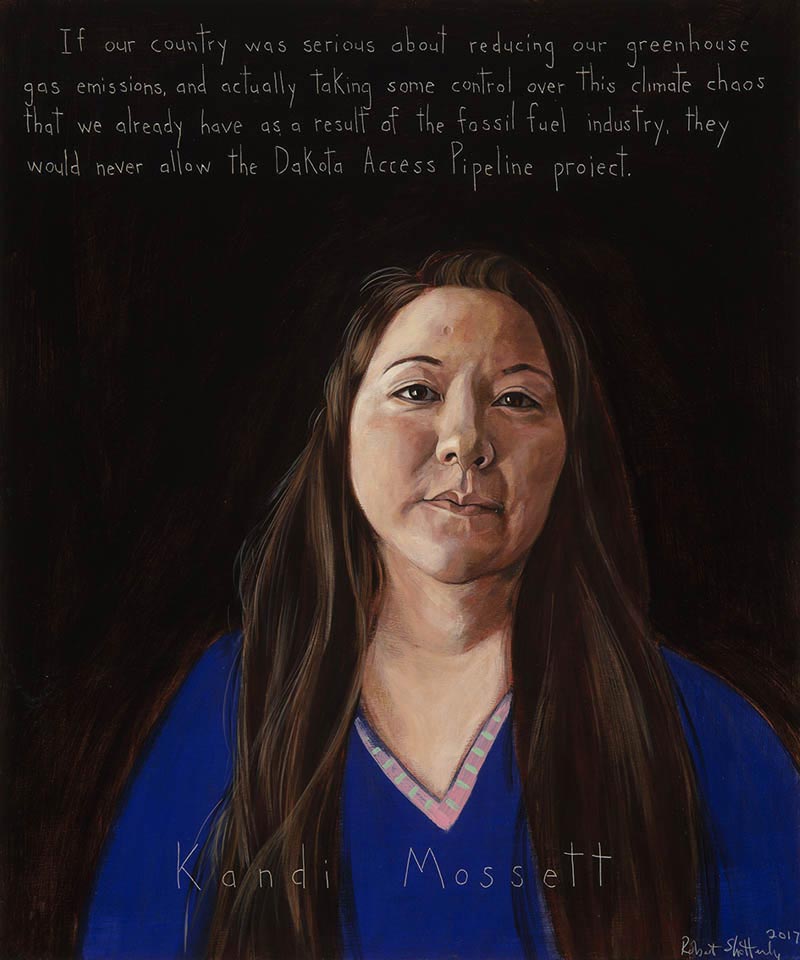
Kandi Mossett
Indigenous and Environmental Rights Activist : b. 1980
“If our country was serious about reducing our greenhouse gas emissions, and actually taking some control over this climate chaos that we already have as a result of the fossil fuel industry, they would never allow the Dakota Access Pipeline project.”
Biography
Battles for environmental justice may seem overwhelming, but activist Kandi Mossett is driven by a simple philosophy: “There is no guarantee that you’re going to win against an injustice that happens to you when you speak out, but we are guaranteed to fail if we don’t at least try.” For her action, her bravery, and her leadership, Mossett was named “An Activist to Watch” by Bill Moyers and Company in 2013. Mosset had just participated in the Energy Action Coalition’s Power Shift Conference in Pittsburgh, where more than 8,000 young activists gathered to plan action against harm to the environment resulting from fracking, the Keystone Pipeline, and university investment in fossil fuel companies.
In 2016, Mossett became a key voice for her fellow protesters at Standing Rock, Tweeting updates and speaking to the media about the fight against the Dakota Access Pipeline. She and other protesters spent months in an encampment at Standing Rock, bringing their message of environmental justice to a worldwide audience. They believed that the pipeline would cause disruption, environmental devastation, and health problems to the communities it ran through. They stood up against the construction of the pipeline, facing harassment and hostility from law enforcement.
After the protest at Standing Rock, Mossett and thousands of other protesters gathered in Washington, D.C. for a four-day community gathering. Their goal was to celebrate Native American arts and culture, as well as make their presence known to lawmakers and educate citizens on how to participate in lobbying lawmakers to support their cause. Mossett believes that activism takes place in the community and in the legislatures: “Another component, …in addition to doing grassroots work is to get involved in politics. …They won’t represent you unless you make your voice heard in your town, in your community, in your state.”
Standing Rock catapulted Mossett into the spotlight, but her career as an activist began years before. Mossett grew up in North Dakota, a member of the Mandan, Hidatsa, Arikara tribes. She left her home, the Fort Berthold Reservation, for the University of North Dakota, where she studied natural resource and park management. After serving three years at the National Park Service, Mossett returned to university and earned a master’s in environmental science and policy. In 2007, she was hired at Tribal Campus Climate Challenge organizer with the Indigenous Environmental Network.
In that role, Mossett worked with more than thirty tribal colleges on projects ranging from recycling programs and tree plantings to small-scale solar panel installations, community gardens, and green jobs. She also mobilized students around issues such as the Keystone pipeline and the dangers of hydraulic fracturing on Native American lands. Eventually, Mossett moved on to become the IEN’s Lead Organizer on its Extreme Energy and Just Transition Campaigns.
Mossett’s work is not just about the earth–she understands that people and communities are affected by harm to the environment. “We are where the extraction zones are, and we’re sick. We have cancer, we have asthma. I’m a cancer survivor. That’s our reality. I used to think it was normal, until I left the reservation and found out that’s not normal. There has to be an awakening, and it’s just really sad that it takes something this dramatic and this violent for that awakening to happen.”
Thanks to Mossett’s organizing efforts in her hometown of Fort Berthold, activists were successful in shutting down a solid waste disposal pit in the community of White Shield and in relocating displaced residents of the Prairie Winds Trailer Court in the community of New Town, N.D.
Even when protests end in disappointment, Mossett believes that it’s important to keep fighting. She has advice for citizens who see injustices happening around them: “Above all, fight to protect all life; be a voice for all those that can’t speak and never give up hope.” Mossett believes that protest is not just a right, but a responsibility, especially for Native populations whose land is used by the fossil fuel industry. She says “…we inherently have a right and an obligation to protect the soil that we grow our food in, the water that we’re going to drink and the air we live and breathe. And as we continue to allow the fossil fuel industry to poison it, we are poisoning ourselves. There’s no question anymore for indigenous people that this is literally life or death. So when it comes to indigenous populations around the world, we choose to fight, to stand up and to have a voice.”
Programs
Americans Who Tell the Truth (AWTT) offers a variety of ways to engage with its portraits and portrait subjects. Host an exhibit, use our free lesson plans and educational programs, or engage with a member of the AWTT team or portrait subjects.

Education
AWTT has educational materials and lesson plans that ask students to grapple with truth, justice, and freedom.

Exhibits & Community Engagement
AWTT encourages community engagement programs and exhibits accompanied by public events that stimulate dialogue around citizenship, education, and activism.